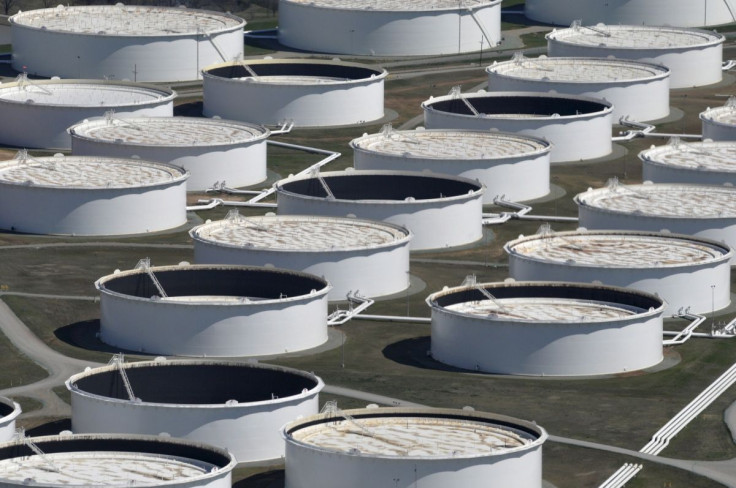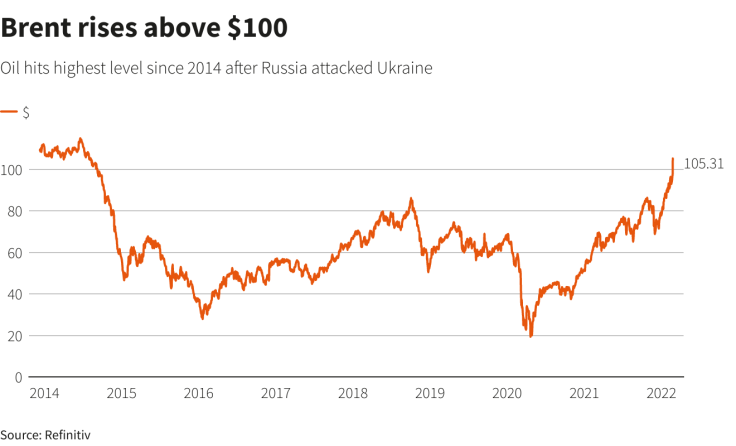Oil Tops $105/bbl After Russia Attacks Ukraine

Oil prices jumped on Thursday, with Brent rising above $105 a barrel for the first time since 2014 before easing, after Russia's attack on Ukraine exacerbated concerns about disruptions to global energy supply.
Russia launched an all-out invasion of Ukraine by land, air and sea in the biggest attack by one state against another in Europe since World War Two.
U.S. President Joe Biden unveiled harsh new sanctions against Russia, imposing measures to impede its ability to do business in the world's major currencies along with sanctions against banks and state-owned enterprises.
Britain announced new measures targeting banks, members of Putin's inner circle and the very wealthy who enjoy high-rolling London lifestyles. UK Prime Minister Boris Johnson said that the West must end its reliance on Russian oil and gas.
Global benchmark Brent crude rose $2.24, or 2.3%, to settle at $99.08 a barrel, after touching a high of $105.79.
U.S. West Texas Intermediate (WTI) crude rose 71 cents, or 0.8%, to settle at $92.81 a barrel, after earlier rising to $100.54.
Brent and WTI hit their highest levels since August and July 2014, respectively.
Later in the session, prices eased after Biden said the United States is working with other countries on a combined release of additional oil from global strategic crude reserves.
The news around reserve releases is "having a psychological impact, but whether there is a real impact will take a few weeks to determine," said Phil Flynn, senior analyst at Price Futures Group in Chicago.
Russia is the third-largest oil producer and second-largest oil exporter, said UBS analyst Giovanni Staunovo. "Given low inventories and dwindling spare capacity, the oil market cannot afford large supply disruptions," he added.
Russia is also the largest provider of natural gas to Europe, providing about 35% of its supply.
At least three major buyers of Russian oil were unable to open letters of credit from Western banks to cover purchases on Thursday, sources told Reuters.
China warned of the impact of tensions on the stability of the energy market.
"All countries that are truly responsible should take responsible actions to jointly maintain global energy security," a Chinese foreign ministry spokesperson said.
Graphic: Brent rises above $100 -

In the United States, commercial crude inventories rose 4.5 million barrels last week to 416 million barrels, much more than analysts' expectations in a Reuters poll for a 400,000-barrel build. [EIA/S]
However, crude in the U.S. SPR fell 2.4 million barrels to 582.4 million barrels, its lowest since 2002, government data showed.
Globally, oil supplies remain tight as demand recovers from pandemic lows.
Reflecting the tightness, the premium on Brent contracts for loading in one month over contracts for loading in six months, a metric closely watched by traders, hit a record high at $13.07 a barrel.
Analysts say Brent is likely to remain above $100 a barrel until significant alternative supplies become available from U.S. shale or Iran, for example.
The United States and Iran have been engaged in indirect nuclear talks in Vienna that could lead to the removal of sanctions on Iranian oil sales.
Iran's top security official, Ali Shamkhani, said on Twitter that it is possible to achieve a good nuclear agreement with Western powers after significant progress in negotiations.
Analysts are warning of inflationary pressure on the global economy from $100 oil, especially for Asia, which imports most of its energy needs.
"Asia's Achilles heel remains its vast import needs for energy, with surging oil prices bound to take a hefty bite out of income and growth over the coming year," said HSBC economist Frederic Neumann.
© Copyright Thomson Reuters 2024. All rights reserved.





















